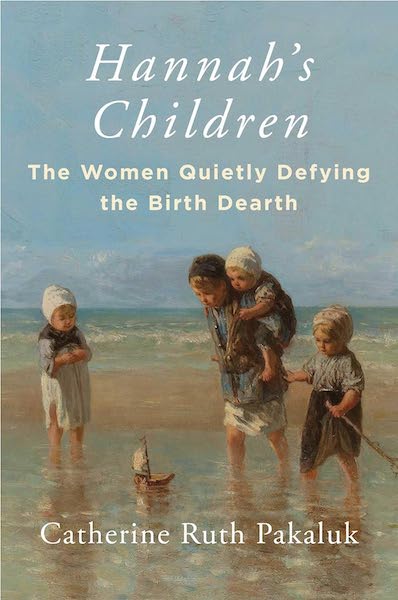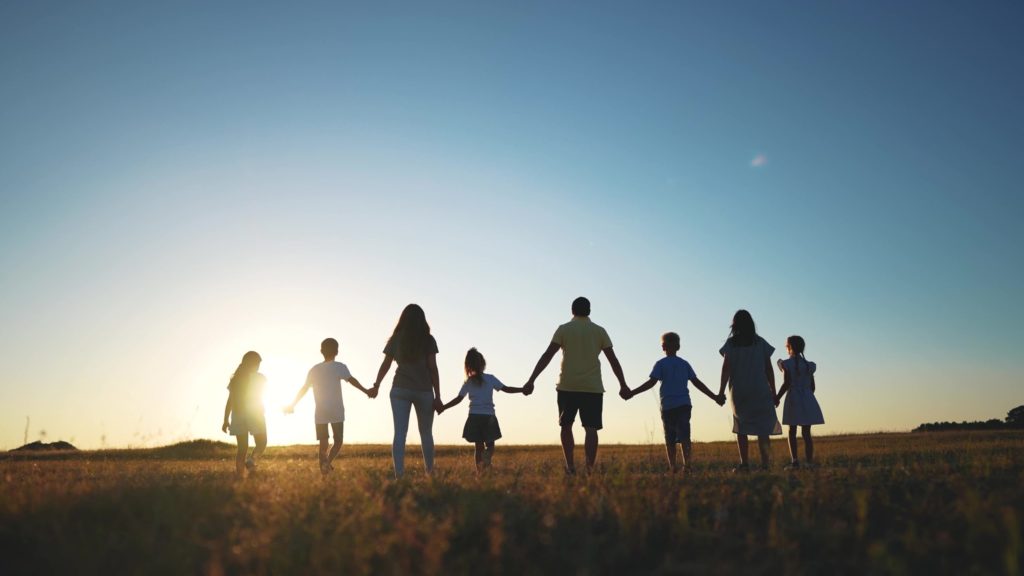Author Catherine Ruth Pakaluk, Harvard-trained economist and mother of eight, realized somewhere along the line that “in a two-child world, an eight-child choice begs for an explanation.”
The result is a book called “Hannah’s Children: The Women Quietly Defying the Birth Dearth” (Regnery Gateway, $24.99).
Pakaluk happens to be Catholic but she didn’t choose her family size because the Church decreed it. Our stance on abortion and birth control notwithstanding, as Pakaluk points out, “There’s no doctrine that it’s holier to end up with more kids.”
And in fact (read it and weep), Catholics use birth control at about the same rate as everyone else.
With the birthrate tumbling, only 5% of U.S. females currently have five or more kids. (Pakaluk chose five or more because five struck her as the tipping point indicating conscious commitment to a big family). What drives these women? she began to wonder.
But first, she asked herself.
“I supposed it boils down to some sort of deeply held thing, possibly from childhood — a platinum conviction — that the capacity to conceive children, to receive them into my arms, to take them home, to dwell with them in love, to sacrifice for them as they grow, and to delight in them as the Lord delights in us, that that thing, call it motherhood, call it childbearing, that that thing is the most worthwhile thing in the world — the most perfect thing I am capable of doing.”
In the summer of 2019, she and a colleague, Emily Reynolds, traveled to 10 American regions and interviewed 55 other women with five or more children “to find out why they do what they do and what they think it means — for themselves, for their families, and for the nation.”
 The book comprises a series of more or less unedited conversations about the nature of their childbearing decisions.
The book comprises a series of more or less unedited conversations about the nature of their childbearing decisions.
Hannah, 44, and Esther, 42, neighbors in a small New England college town and both Jewish, kick off the book. Esther is nursing her ninth kid, 2 weeks old, as the conversation takes place.
Hannah tends to her seventh, just about to turn one.
Hannah always planned on a large family, but Esther never even wanted to get married.
Along with most of the other women in the book, Hannah and Esther had consciously discarded “an autonomous, customized, self-regarding lifestyle” in favor of something higher. Hannah’s reasons, she said, were super-rational, “reasons of the heart.”
Instead of losing themselves, Hannah and Esther both felt they had found themselves in having children, that there wasn’t less of them, but rather more.
Humanity is linked in a chain, they observed. To have children links us in a specific way, going back to our ancestors, and in the other direction to an infinite future.
Everyone’s searching for an identity: their identities and meaning had come to be grounded in motherhood. The life is hard, the life involves self-sacrifice, but it also brings an inner peace. As a self-propelled youth, Hannah was searching. “I’m not searching now.”
The stories unfold from there. Some of the women reside in tiny zip codes; others live paycheck to paycheck. Many have advanced degrees; others haven’t gone much past high school. Some women chose to continue to work outside the home; others are content to let their husbands be the breadwinners. Some continued full-time academic or corporate careers; others adapted to part time or let the careers lapse completely while their kids were young. Some homeschooled; others sent the children to public, private, or Catholic schools.
Many follow a religious faith; others are resolutely secular. Some women were seemingly born wanting large families so that when the time came, they more or less effortlessly found a mate who wanted the same thing and started happily in.
Others had been initially horrified at the thought of a large, or really any, family, but had come around, sometimes through a religious conversion; sometimes through the influence of a spouse, family, and friends; sometimes through inner searching that had led them to realize that the chains imposed by a lemming-like, consumerist culture are infinitely more binding than the limits imposed by a large family.
Throughout, almost to a woman, runs the idea that children are simply a rock-bottom good. A good in and of themselves, a good to those who bear and nurture them, a good to the nation and to the world. Also, of course, an incredible amount of work, a cause of anxiety, a sacrifice of sleep, time, effort, money, often vacations, often career, and always a sacrifice of a certain kind of ease and rest, no matter how materially wealthy the household.
Throughout, to a woman, runs the conviction that no matter what, the children were absolutely the right choice.
To bear and raise children is to contribute in the deepest possible way to the good of mankind, and to enter in the deepest possible way into the mystery of existence.
Observed Hannah Arendt in her 1958 classic “The Human Condition”: “It is, in other words, the birth of new men and the new beginning, the action they are capable of by virtue of being born. Only the full experience of this capacity can bestow upon human affairs faith and hope.”

